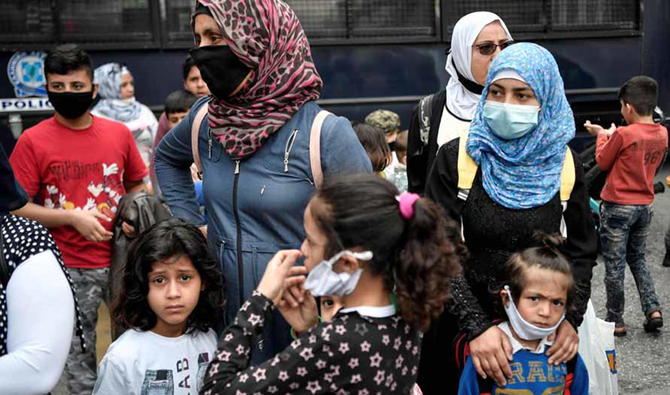ROME: The Tunisian Coast Guard thwarted several attempts by traffickers to take migrant groups to the coast of Italy in the past few days as the weather improves.
Fear of infection has not deterred the migrants — Italy still considers its ports as “not safe” from the COVID-19 pandemic although the number of new cases in the country has drastically fallen in the past week.
Tunisian National Guard spokesman Houssem Eddine Jebabli said that 49 people were stopped in the Sfax and Nabeul governorates as they were about to board boats and dinghies to reach Sicily.
Tunisian Coast Guard units in El Amra, in the Sfax governorate, intercepted a boat which had been stolen a few days earlier from local fishermen. Fourteen people aged between 20 and 29 were on board, all from Tunis and Sfax. Five of them were wanted by the police for petty crimes. The officers also seized significant sums of money in foreign currency, which they believed had been paid by the migrants to traffickers to take them to Italy.
The Tunisian prosecutor confirmed the arrest of eight people, and said others had also been charged but not detained. In Sidi Youssef, in the Kerkennah Islands, the coast guards arrested eight people aged between of 20 and 32 from Sfax and Gabes and charged them with preparing an illegal trafficking operation. The suspects, who were found with 16,000 Tunisian dinars (SR20,000) in their possession, were all charged by the public prosecutor, and three were detained.
In the Nabeul governorate, coast guard units intercepted a boat off the coast of Korba with 21 people aboard, mostly from Nigeria, heading toward Italy.
“The migrants said they spent all their money to pay for the trip from North Africa to Europe. Now they are desperate. We are sure they will try to reach Italy again as soon as they can find a way,” a spokesman for the Intersos charity told Arab News.
Despite the Tunisian authorities’ efforts, migrants from Tunisia continue to make the journey.
Italian police said that 71 Tunisians disembarked on the island of Lampedusa on Wednesday. They were intercepted by an Italian Finance Police patrol boat on a dinghy 10 miles off the coast and were taken to the migrant reception center on the island.
The Catholic charity Caritas Intemelia in Ventimiglia, in northwestern Italy, reported that the passage of migrants, mainly Afghans, had resumed at the border with France. The charity, which has reopened its socio-legal assistance office in the town, said the French authorities have been “extremely strict” in patrolling the border, sending migrants back to Italy, including mothers with children. It believed migrants want to go to France as they feel safer from COVID-19 in that country.
Maurizio Marmo, the director of Caritas Intemelia, said: “In the light of the new Italian decree on foreigners who have the necessary requirements, we will examine individual situations, evaluating the possibility for legalization.”
The charity is also awaiting information about developments at the Parco Roja migrant center, which has been under quarantine for weeks after one person tested positive for COVID-19.
“In the past two months we have recorded very few crossings between Italy and France,” Marmo said. “At the moment our center is full and the kitchen is still closed due to the health emergency, but we continue to distribute food packages to those in transit.
“We understand that a Moroccan mother and a Senegalese mother were sent back by French police guards. Children younger than 10 years old were traveling with them. They were assisted by volunteers from other humanitarian organizations.”
The socio-legal service for migrants in Ventimiglia is a collaboration with the Waldensian Migrant Service and the nonprofit organization WeWorld.
















